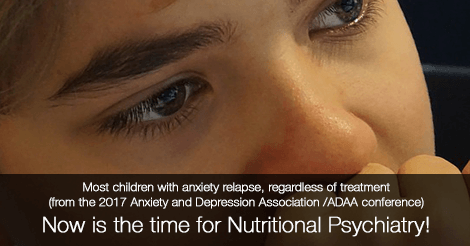
Most children with anxiety relapse, regardless of treatment! This is the title of a recent article on Medscape and is just heart-breaking to read. The article is reporting on a presentation from the 2017 Anxiety and Depression Association/ ADAA conference: Results from the Child Adolescent Anxiety Multi Modal Extended Long term Study CAMELS.
As a nutritionist educating and consulting with individuals with anxiety, using nutritional and biochemical approaches with great success, this is just not acceptable. I know we can do better and now is the time to be incorporating nutritional psychiatry. I’ll go as far to say let us start with nutrition.
Here is the message from the Medscape article (you will need to create a userid and password to be able to view it online)
Children treated for anxiety disorders with psychotherapy, antidepressants, or a combination of the two show no significant differences in outcomes or remission at 5-year follow-up. Furthermore, a majority of children experience relapse and chronic anxiety, new long-term data show.
Scott Compton, PhD, associate professor of psychiatry and behavioral sciences at Duke University School of Medicine, in Durham, North Carolina comments on the study:
For the majority of children with anxiety, the results … suggest that anxiety might be best characterized as a chronic disorder that needs to be managed.
With that in mind, further tailoring is needed to more individually address patients’ needs
As a field, we need to shift our approach away from a ‘one protocol fits all’ to figuring out how best to sequence treatments for the sizeable percentage of children who do not respond to current evidence-based interventions.
I don’t think Dr. Compton was thinking about nutrition when he said this but clearly the current evidence-based interventions are not working for most children and this is where nutrition comes in.
I also feel that anxiety should not be seen as a condition that has to be managed, instead we should be sharing the message that it can be eliminated, and providing long-term solutions to achieve this.
Here is the comment I posted on the article (and I also reached out to the study authors and shared this via email):
Research like this further confirms that we need to be incorporating nutritional interventions and biochemical approaches. We now have the results of the SMILES diet depression trial (published January 2017): the first randomized controlled diet depression study where ONE THIRD of the dietary intervention group saw improvements in their depression symptoms. This was just diet alone and switching from processed/junk food to real food with no specific dietary restrictions. Participants also reported improvements in anxiety symptoms.
When we customize diet we see further improvements and examples include the removal of gluten, caffeine, sugar and the addition of quality animal protein (especially at breakfast), organic vegetables and fruit and healthy fats. Addressing specific deficiencies is key too: low zinc, low iron, low serotonin, low GABA, low vitamin B6, low vitamin D etc. And addressing gut health and balancing the microbiome is imperative. There is research supporting all of the above and it’s effective in clinical practice – it simply needs to be part of the treatment of care for all anxious individuals.
A wonderful organization is the International Society for Nutritional Psychiatry Research (ISNPR). Their first international conference will be held in Bethesda in July this year. Another excellent conference is IMMH/Integrative Medicine for Mental Health. For practitioners in Australia, the MINDD forum is an excellent resource.
I would love to see more collaboration between practitioners and researchers in the nutritional/functional medicine/nutritional psychiatry space and practitioners and researchers in traditional psychiatry. I feel we have so much to learn from each other.
My hope is that we can open communication and start to collaborate in order to serve all the anxious children and adults with all the options we have at our disposal!
As stated in this 2017 paper – Nutritional Psychiatry: Where to Next? nutritional psychiatry is an emerging field and
offers much promise for addressing the large disease burden associated with mental disorders. A consistent evidence base from the observational literature confirms that the quality of individuals’ diets is related to their risk for common mental disorders, such as depression [and anxiety].
This is the case across countries and age groups. Moreover, new intervention studies implementing dietary changes suggest promise for the prevention and treatment of depression [and anxiety].
Concurrently, data point to the utility of selected nutraceuticals as adjunctive treatments for mental disorders and as monotherapies for conditions such as ADHD.
Finally, new studies focused on understanding the biological pathways that mediate the observed relationships between diet, nutrition and mental health are pointing to the immune system, oxidative biology, brain plasticity and the microbiome-gut-brain axis as key targets for nutritional interventions.
Here are just a few additional links with research supporting nutrition for anxiety:
- Nutritional medicine in modern psychiatry: position statement by ISNPR
- Nutritional medicine as mainstream in psychiatry
- Integrative Medicine Approach to Pediatric Obsessive-Compulsive Disorder and Anxiety
- Oral GABA supplementation allows better prioritizing of planned actions: new research
- Tryptophan and ascorbic acid for anxiety caused by lead toxicity
And here is some feedback from individuals who have benefited from some of these approaches:
- Paleo and grain free diets: anxiety and depression success stories
- GABA helps with Lyme anxiety (while addressing the underlying disease)
- GABA for children: ADHD, focus issues, irritability, anxiety and tantrums
If you are a practitioner who works with anxious children or adults use these resources to stay at the cutting edge of nutritional psychiatry.
If you have children with anxiety or are someone who suffers from anxiety, use this information to be informed of the latest research and be sure to share this with your practitioner.
And please let me know if you have any questions. As always I love to hear success stories so feel to share those too.
Leave a Reply